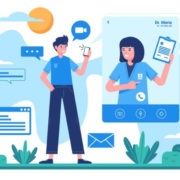Leveraging Technology in Healthcare Recruitment Processes
The healthcare industry is undergoing a transformative journey, and technology is playing a pivotal role in reshaping traditional recruitment processes. In this blog post, we will explore how healthcare organizations are leveraging technology to streamline recruitment, attract top talent, and enhance the overall efficiency of their workforce management.
Also Read: Transitioning from Nursing to a Medical Career
The Changing Landscape of Healthcare Recruitment
Begin by discussing the evolving landscape of healthcare recruitment, highlighting the increasing demand for skilled professionals, the impact of digitalization, and the need for innovative solutions to address staffing challenges.
The Role of Technology in Healthcare Recruitment
Examine the multifaceted role that technology plays in healthcare recruitment:
- Applicant Tracking Systems (ATS): Explore how ATS software automates the recruitment process, from posting job openings to managing applications, screening candidates, and tracking their progress. Discuss the efficiency gains and improved candidate experience associated with ATS.
- AI-Powered Recruitment: Delve into the use of artificial intelligence (AI) in healthcare recruitment, including the ability to analyze resumes, match candidates with job requirements, and even conduct initial interviews. Discuss the benefits of AI in reducing bias, saving time, and enhancing decision-making.
- Telemedicine and Virtual Interviews: Explore the adoption of telemedicine and virtual interviews, especially in the context of the COVID-19 pandemic. Discuss how virtual interactions have become integral to the recruitment process, enabling healthcare organizations to connect with candidates globally.
- Data Analytics for Predictive Hiring: Discuss the use of data analytics in predicting hiring needs, identifying trends, and making informed decisions. Explore how predictive analytics can help healthcare organizations anticipate staffing requirements based on patient demand and other factors.
- Mobile Recruitment Apps: Highlight the importance of mobile recruitment apps in reaching and engaging with candidates. Discuss how mobile platforms enhance accessibility, allowing healthcare professionals to explore job opportunities on-the-go.
Enhancing Candidate Experience
Explore how technology contributes to an improved candidate experience in healthcare recruitment:
Seamless Application Processes: Discuss the importance of user-friendly application processes enabled by technology, reducing friction and ensuring that candidates can easily apply for positions.
Virtual Tours and Interactive Content: Explore how virtual reality (VR) and augmented reality (AR) are utilized to provide virtual tours of healthcare facilities, giving candidates a glimpse into the workplace environment. Discuss the impact of interactive content on candidate engagement.
AI-Powered Chatbots: Discuss the role of AI-powered chatbots in answering candidate queries, providing information about job opportunities, and guiding candidates through the application process. Highlight the efficiency gains and enhanced responsiveness associated with chatbots.
Personalized Communication: Explore how technology enables personalized communication with candidates, including automated emails, updates on application status, and targeted content based on individual preferences and career aspirations.
Streamlining Credentialing and Compliance
Examine how technology streamlines the credentialing and compliance processes in healthcare recruitment:
Digital Credential Verification: Discuss the transition from manual credential verification to digital processes, where healthcare organizations can efficiently verify candidates’ licenses, certifications, and qualifications.
Compliance Automation: Explore how technology automates compliance processes, ensuring that healthcare professionals meet regulatory requirements, undergo necessary training, and adhere to industry standards.
Blockchain in Credentialing: Discuss the potential role of blockchain technology in secure and transparent credentialing, providing a tamper-proof record of healthcare professionals’ qualifications and compliance history.
Social Media and Online Platforms
Explore the impact of social media and online platforms in healthcare recruitment:
Recruitment through Social Networks: Discuss how healthcare organizations leverage social media platforms such as LinkedIn, Facebook, and Twitter to connect with healthcare professionals, share job opportunities, and build a strong employer brand.
Online Job Boards and Platforms: Explore the role of online job boards and specialized healthcare recruitment platforms in reaching a broader audience of potential candidates. Discuss the benefits of targeted job postings and networking opportunities.
Employer Branding in the Digital Age: Highlight the importance of building and maintaining a positive employer brand through online platforms. Discuss how healthcare organizations showcase their workplace culture, values, and employee testimonials to attract top talent.
Training and Development Technologies
Discuss how technology contributes to ongoing training and development in healthcare recruitment:
eLearning Platforms: Explore the use of eLearning platforms for training and upskilling healthcare professionals. Discuss how online courses, webinars, and interactive modules contribute to continuous professional development.
Virtual Reality (VR) Simulations: Discuss the use of VR simulations in healthcare training, allowing professionals to practice skills in a realistic virtual environment. Explore how VR enhances hands-on learning experiences.
Learning Management Systems (LMS): Highlight the role of LMS in tracking and managing training programs, ensuring compliance with ongoing education requirements, and facilitating personalized learning paths for healthcare professionals.
Addressing Diversity and Inclusion
Discuss how technology aids in promoting diversity and inclusion in healthcare recruitment:
AI for Bias Reduction: Explore how AI algorithms can be designed to reduce bias in the recruitment process, ensuring fair evaluation of candidates based on their skills and qualifications.
Blind Recruitment Platforms: Discuss the concept of blind recruitment, where technology is used to anonymize certain candidate details, such as names and photos, during the initial stages of the hiring process to minimize unconscious bias.
Inclusive Job Posting Platforms: Highlight how technology allows healthcare organizations to use inclusive language in job postings, reaching a diverse audience and fostering a culture of inclusivity.
Cybersecurity Considerations
Discuss the importance of cybersecurity in healthcare recruitment processes:
Protecting Sensitive Data: Emphasize the need for robust cybersecurity measures to protect sensitive candidate information, including personal details, medical records, and credentials.
Compliance with Data Protection Laws: Discuss how healthcare organizations and recruitment agencies must comply with data protection laws and regulations, such as HIPAA in the United States or GDPR in Europe.
Secure Communication Channels: Highlight the importance of secure communication channels, especially when sharing sensitive information during the recruitment process.
Challenges and Considerations
Acknowledge the challenges and considerations associated with integrating technology into healthcare recruitment:
Resistance to Change: Discuss the potential resistance to adopting new technologies among healthcare professionals and organizations accustomed to traditional recruitment methods.
Cost Implications: Address the upfront costs and ongoing investments associated with implementing and maintaining technology solutions.
Conclusion:
In the ever-evolving landscape of healthcare recruitment, the integration of technology emerges as a transformative force, revolutionizing traditional processes and fostering unprecedented efficiency. Throughout this exploration of leveraging technology in healthcare recruitment, it becomes evident that innovative solutions have not only streamlined administrative tasks but have also empowered healthcare organizations to make more informed and strategic hiring decisions.







Leave a Reply
Want to join the discussion?Feel free to contribute!